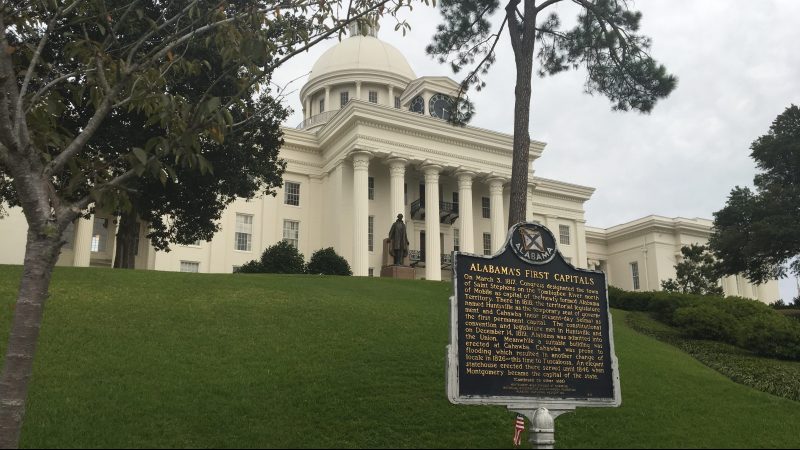Voters Change Constitution With Votes For At Least Five Amendments
Five of the six statewide amendments on Alabama’s ballot passed Tuesday, with another one that proposed several changes to ethics oversight in the state judiciary being too close to call early Wednesday morning.
Most of the measures, including one to “recompile” the constitution to remove racist language and two others establishing county-specific “stand your ground” laws for churches, passed easily.
Voters overwhelmingly passed the ballot’s first statewide amendment, which proposed a mostly aesthetic alteration to the state constitution, changing its language from saying “every” U.S. citizen has a right to vote to saying “only” citizens do. The amendment, put forward by state Sen. Del Marsh, R-Anniston, is part of a national campaign; similar measures appeared on the 2020 ballot in Florida and Colorado. North Dakota passed such an amendment in 2018.
The amendment passed easily with 77.08% of the vote.
In practice, the amendment does not change who can or can’t vote in Alabama, an analyst with the Public Affairs Research Council of Alabama told WBHM.
Amendment 2
It appeared Amendment 2 was headed toward failure early Wednesday morning, but the vote was too close to say for sure. The amendment would make several administrative changes to the state judicial system. The no votes accounted for 51.14% of the vote, but there was just a 41,000-vote difference statewide between passage and failure.
The amendment would increase the membership of the Judicial Inquiry Commission, which oversees ethics complaints against judges, from nine to 11 members and prevented judges from being automatically disqualified from office just because a complaint is filed with the commission.
The amendment also would provide that judges can be removed only by the Court of the Judiciary, which hears complaints filed by the Judicial Inquiry Commission, and would have moved appointment power on that court from the lieutenant governor to the governor.
Finally, the amendment would allow county district courts to not hold city courts in cities with a population of less than 1,000 people, and it would move the power to appoint the administrative director of courts from the chief justice to the full Alabama Supreme Court.
Amendment 3
Amendment 3 also dealt with the judiciary, lengthening the first term of a judge appointed to fill a judgeship left vacant by the death of its previous holder from one to two years. It passed easily with 65% of the vote.
Amendment 4
Voters also passed an amendment allowing the Alabama Legislature to draft a recompiled version of the state constitution, though the only changes that can be made involve removing racist language, removing repetitive or obsolete language, combining language related to economic development and combining language that relates to the same county. The recompiled constitution still would need to be approved by voters.
The amendment passed with 67% of the vote.
Amendments 5 and 6
Amendments 5 and 6 were practically identical, specifically writing into the constitution “stand your ground” laws for churches in Franklin and Lauderdale counties, respectively. Alabama churches statewide already are covered by a stand your ground law, as are all individuals in the state.
These constitutional amendments state that people won’t be held liable “for using deadly physical force in self-defense or in defense of another person on the premises of a church under certain conditions.” Both amendments passed with 72% of the vote statewide. They also had to be passed by voters in the affected counties. In Franklin County, the amendment passed with 89% of the vote. In Lauderdale County, the amendment passed with 82% of the vote.
House Dem. Leader Jeffries responds to air strikes on Iran by U.S. and Israel
NPR's Emily Kwong speaks to House Minority Leader Hakeem Jeffries (D-NY), who is still calling for a vote on a war powers resolution following a wave of U.S.- and Israel-led airstrikes on Iran.
Iran’s Ayatollah Ali Khamenei is killed in Israeli strike, ending 36-year iron rule
Khamenei, the Islamic Republic's second supreme leader, has been killed. He had held power since 1989, guiding Iran through difficult times — and overseeing the violent suppression of dissent.
Found: The 19th century silent film that first captured a robot attack
A newly rediscovered 1897 short by famed French filmmaker Georges Méliès is being hailed as the first-ever depiction of a robot in cinema.
‘One year of failure.’ The Lancet slams RFK Jr.’s first year as health chief
In a scathing review, the top US medical journal's editorial board warned that the "destruction that Kennedy has wrought in 1 in office might take generations to repair."
Here’s how world leaders are reacting to the US-Israel strikes on Iran
Several leaders voiced support for the operation – but most, including those who stopped short of condemning it, called for restraint moving forward.
How could the U.S. strikes in Iran affect the world’s oil supply?
Despite sanctions, Iran is one of the world's major oil producers, with much of its crude exported to China.




